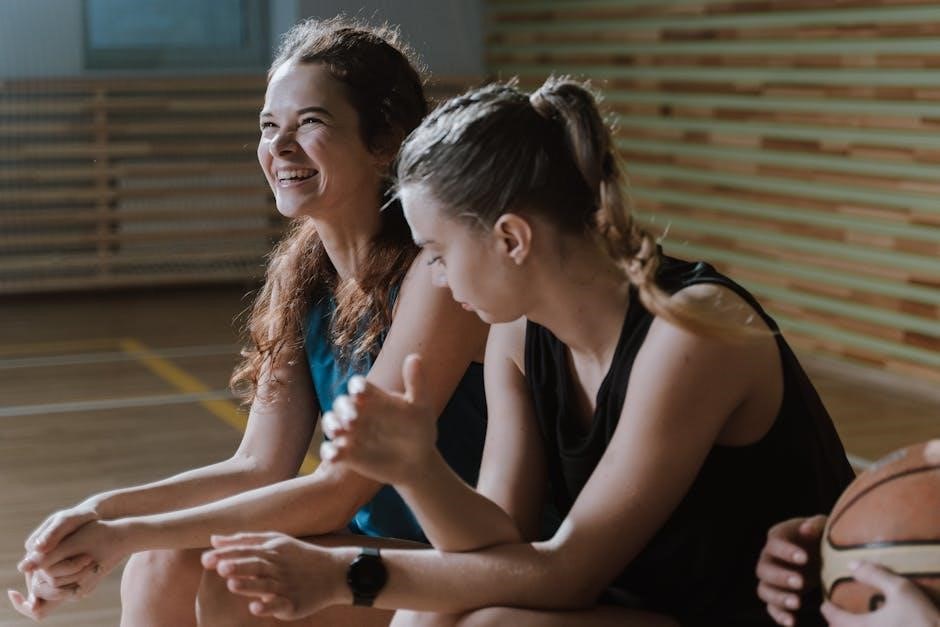Defining Mental Toughness in the Context of Youth Sports
Mental toughness in youth sports refers to an athlete’s ability to perform at their best despite challenges, pressures, or setbacks. It encompasses resilience, focus, and emotional control, enabling young athletes to navigate competitive environments effectively while maintaining their mental well-being and drive to succeed.
1.1. Understanding the Concept of Mental Toughness
Mental toughness is defined as an athlete’s ability to perform optimally under pressure, adversity, or challenging situations. It involves resilience, emotional regulation, and focus, enabling young athletes to maintain composure and confidence. This concept is crucial in youth sports, as it helps athletes adapt to setbacks, recover from failures, and stay motivated. Mental toughness is not innate but can be developed through practice, training, and supportive environments, ultimately enhancing both performance and personal growth.
1.2. The Importance of Mental Toughness in Youth Sports
Mental toughness is vital in youth sports as it helps athletes cope with pressure, anxiety, and failure. It fosters resilience, enabling young athletes to bounce back from setbacks and maintain their confidence. Additionally, mentally tough athletes often demonstrate better focus, goal-setting abilities, and emotional regulation. These traits not only enhance performance but also contribute to overall mental well-being and life skills, making mental toughness a cornerstone of successful athletic development and personal growth in young athletes.
Key Components of Mental Toughness for Young Athletes
Mental toughness for young athletes involves resilience, focus, and emotional regulation, enabling them to handle stress and setbacks while maintaining confidence and drive in competitive sports environments.
2.1. Resilience and Stress Management
Resilience and stress management are core components of mental toughness, enabling young athletes to bounce back from setbacks and perform under pressure. Techniques like mindfulness and breathing exercises help regulate emotions, reducing anxiety and enhancing focus. These skills not only improve sports performance but also foster overall mental well-being, teaching athletes to thrive in challenging situations both on and off the field.
2.2. Focus, Concentration, and Goal Setting
Focus and concentration are essential for young athletes to maintain optimal performance under pressure. Goal-setting strategies, such as creating SMART (Specific, Measurable, Achievable, Relevant, Time-bound) objectives, help athletes stay motivated and directed. Techniques like mindfulness and visualization enhance their ability to stay present and focused during competitions. By mastering these skills, young athletes can improve their decision-making, maintain composure, and achieve their potential, both in sports and beyond.
2.3. Emotional Regulation and Mindfulness
Emotional regulation and mindfulness are crucial for young athletes to manage stress and maintain composure under pressure. Techniques like deep breathing, visualization, and present-moment awareness help athletes stay focused and calm. By practicing mindfulness, young athletes can better recognize and control their emotions, reducing anxiety and enhancing resilience. These practices foster mental clarity, allowing athletes to perform at their best while maintaining emotional balance, both on and off the field.

Developing Mental Toughness in Young Athletes
Developing mental toughness in young athletes involves a holistic approach, combining training strategies, mindfulness practices, and emotional regulation to build resilience, focus, and confidence for long-term success.
3.1. Training Strategies for Building Mental Toughness
Effective training strategies for building mental toughness include mindfulness exercises, visualization techniques, and positive self-talk. Coaches often incorporate goal-setting activities to enhance focus and motivation. Stress management tools, such as breathing exercises and emotional regulation, help athletes stay composed under pressure. Additionally, exposing young athletes to challenging yet supportive environments fosters resilience and adaptability. These strategies, supported by the MTQ18 questionnaire for assessment, create a comprehensive approach to developing mental toughness in young athletes, preparing them for both sports and life challenges.
3.2. The Role of Coaches and Parents in Fostering Mental Toughness
Coaches and parents play a crucial role in fostering mental toughness by creating supportive environments that encourage resilience and growth. Positive reinforcement, open communication, and modeling healthy emotional responses help young athletes build confidence and perseverance. Coaches can integrate mental skills training into practice, while parents provide emotional support and reinforce positive attitudes. Their combined efforts help athletes develop the mindset needed to overcome challenges and thrive both on and off the field.
3.3. The Impact of Practice and Competition on Mental Skills Development
Practice and competition are vital for developing mental toughness in young athletes. Consistent practice helps build resilience and focus, while competitions test these skills under pressure. Structured training sessions can incorporate mental exercises to enhance emotional regulation and goal-setting abilities. Coaches should use these opportunities to teach mindfulness techniques, fostering a growth mindset that allows athletes to learn from both successes and failures, ultimately improving their mental resilience and overall performance in sports.

Mental Toughness Exercises and Practices for Young Athletes
Mental toughness exercises include 5-minute mindset practices, goal-setting activities, and stress management techniques to enhance resilience, focus, and emotional regulation in young athletes.
4.1. Five-Minute Mindset Exercises for Kids and Teens
Five-minute mindset exercises, such as visualization and breathing techniques, help young athletes build resilience and focus. These short, practical activities, emphasized by experts like Troy Horne, are designed to enhance mental clarity and emotional control. They empower kids and teens to stay calm under pressure, reinforcing positive thinking and confidence. Regular practice of these exercises fosters a strong mental foundation, essential for overcoming challenges in sports and life, aligning with the broader goals of mental toughness development.
4.2. Goal-Setting Activities for Increased Motivation
Goal-setting activities are powerful tools for boosting motivation in young athletes. By defining clear, achievable objectives, athletes gain direction and purpose. Activities like creating SMART (Specific, Measurable, Achievable, Relevant, Time-bound) goals help athletes stay focused and driven. Dr. Harry Lim emphasizes how these exercises enhance motivation by providing a roadmap for success. Regularly reviewing and adjusting goals fosters a growth mindset, encouraging persistence and resilience. This process not only improves performance but also strengthens mental toughness, preparing athletes to overcome challenges with confidence and determination.
4.3. Techniques for Managing Stress and Anxiety in Sports
Young athletes can manage stress and anxiety through mindfulness, controlled breathing, and visualization. These techniques help regulate emotions and maintain focus during high-pressure situations. Mindfulness practices, such as meditation, foster mental calm, while controlled breathing exercises reduce physiological stress responses. Visualization enables athletes to mentally rehearse successful outcomes, boosting confidence and resilience. Additionally, resilience training and stress management strategies, as highlighted in the Mental Toughness Questionnaire, empower athletes to handle adversity effectively, promoting both mental well-being and improved performance in sports.

The Role of Mental Toughness in Overcoming Challenges
Mental toughness enables young athletes to overcome obstacles by fostering resilience, focus, and confidence, helping them adapt to adversity and thrive under pressure in sports and life.
5.1. Bouncing Back from Failure and Adversity
Mental toughness helps young athletes recover from setbacks by fostering resilience and a growth mindset. It teaches them to view failure as a learning opportunity, staying focused and motivated. Emotional regulation and stress management are key, enabling athletes to maintain composure under pressure. By embracing challenges, they build confidence and develop the ability to adapt and overcome adversity, both in sports and life, ensuring long-term personal and athletic growth.
5.2. Developing a Growth Mindset in Young Athletes
A growth mindset, a key component of mental toughness, empowers young athletes to believe their abilities can improve through effort and perseverance. This mindset helps them view challenges as opportunities for growth rather than obstacles. By embracing feedback and focusing on progress, athletes build resilience and confidence. Mental toughness fosters a culture of continuous improvement, enabling young athletes to stay motivated and adapt to the demands of sports and life, ultimately enhancing their performance and personal development.
5.3. Building Confidence and Self-Belief
Confidence and self-belief are foundational to mental toughness, enabling young athletes to trust their abilities and perform under pressure. Positive reinforcement, celebrating small wins, and focusing on effort rather than outcomes help build self-assurance; Athletes with strong self-belief are more resilient, taking risks and bouncing back from setbacks. Mental toughness programs often include exercises that foster self-belief, such as visualization and positive self-talk, helping athletes develop the inner strength needed to excel in sports and beyond, ensuring lasting personal growth and success.
Mental Health and Mental Toughness in Young Athletes
Mental health is crucial for developing resilience and optimal performance in young athletes; It fosters a positive mindset, enabling them to manage stress and overcome challenges effectively.
6.1. The Relationship Between Mental Health and Performance
Mental health plays a significant role in optimizing performance for young athletes. Positive mental well-being enhances focus, confidence, and resilience, while poor mental health can hinder physical and emotional execution. Athletes with strong mental health tend to perform better under pressure, recover faster from setbacks, and maintain consistent effort. Conversely, untreated mental health issues can lead to decreased motivation, reduced concentration, and impaired decision-making. Thus, fostering mental health is essential for achieving peak performance and overall success in sports;
6.2. Promoting Healthy Mental Habits in Young Athletes
Promoting healthy mental habits in young athletes involves fostering resilience, emotional regulation, and mindfulness. Encourage open conversations about mental health to reduce stigma. Teach relaxation techniques, such as deep breathing, to manage stress. Incorporate mindfulness exercises into training to enhance focus and calmness. Coaches and parents should model positive behaviors and provide consistent support. Encourage a balanced lifestyle, including adequate sleep and downtime, to prevent burnout. Educate athletes on the importance of mental well-being and empower them to prioritize self-care. Positive reinforcement and constructive feedback can further build confidence and resilience.
6.3. Addressing the Misconceptions About Mental Toughness
A common misconception is that mental toughness means being emotionless or aggressive. In reality, it involves understanding and managing emotions effectively. Another myth is that mental toughness is innate, when it can be developed through practice and training. It’s not about suppressing feelings but learning to perform well under pressure while maintaining emotional balance. Dispelling these misconceptions helps young athletes adopt healthier, more constructive approaches to building mental resilience.

Future Directions in Mental Toughness Training for Youth Athletes
Future directions include integrating mental skills into holistic training programs, leveraging technology for personalized development, and creating supportive environments that foster long-term mental growth and resilience in young athletes.
7.1. Integrating Mental Skills into Holistic Training Programs
Holistic training programs combine physical, technical, and mental skills to foster overall athlete development. Integrating mental toughness into these programs ensures young athletes build resilience, focus, and emotional regulation alongside physical prowess. This approach emphasizes practical tools like mindfulness, goal-setting, and stress management to enhance performance and well-being. By embedding mental skills into daily routines, coaches and parents can help athletes develop a balanced and robust foundation for success in sports and life, promoting long-term mental and physical growth.
7.2. The Role of Technology and Digital Tools in Mental Toughness Development
Technology and digital tools are revolutionizing mental toughness training for young athletes. Apps, virtual reality, and AI-driven platforms provide interactive and personalized exercises to enhance resilience, focus, and emotional regulation. Digital resources like mindset exercises and mental toughness questionnaires offer accessible and engaging ways for athletes to develop these skills. These tools also enable real-time feedback and progress tracking, making mental training more effective and tailored to individual needs, ensuring comprehensive development for young athletes in modern sports environments.
7.3. Creating Supportive Environments for Mental Growth
Creating supportive environments is crucial for fostering mental growth in young athletes. Coaches, parents, and peers play key roles in encouraging resilience and confidence. Positive communication, constructive feedback, and a culture of learning from failure help athletes thrive. These environments reduce pressure and promote emotional well-being, enabling young athletes to develop mental toughness naturally. Collaboration between all stakeholders ensures a holistic approach to mental development, fostering long-term success both on and off the field.
Mental toughness empowers young athletes to overcome challenges, build resilience, and achieve their full potential. It fosters a mindset that benefits not just sports but life itself.
8.1. The Long-Term Benefits of Mental Toughness for Young Athletes
Mental toughness cultivates resilience, emotional regulation, and confidence, benefiting young athletes beyond sports. These qualities enhance adaptability, perseverance, and self-belief, equipping them to handle life’s challenges and thrive in personal and professional pursuits.
8.2. Encouraging Lifelong Mental Resilience in Athletes
Encouraging mental resilience in young athletes fosters a lifelong capacity to adapt to challenges, both in sports and beyond. By teaching mindfulness, goal-setting, and emotional regulation, athletes develop the tools to manage stress and setbacks. Coaches and parents play a crucial role in nurturing these skills, creating supportive environments that promote perseverance and self-belief. This foundation of resilience empowers athletes to excel not only on the field but also in their personal and professional lives, ensuring lasting mental strength and adaptability.



